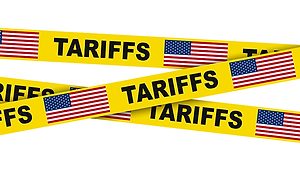NACD Distributor Roundtable Discussion
October 3, 2023
NACD Distributor Roundtable Discussion
October 3, 2023Association members weigh in on the latest challenges to their businesses, sustainability expectations, and implementing innovative technology.
Chemical distribution plays a critical role in the smooth, safe, and responsible movement of critical chemicals that are used in nearly every U.S. industry, including the medicines we take, the food we eat, and the municipal water we drink. For the paint and coatings industry, chemical distributors help manufacture, deliver, and store the products that are necessary for the fulfillment of customers’ orders, such as coatings for life-saving medical equipment, cleaning products, mold-mildewcide treatments, the interior coating of steel and aluminum food and beverage cans, and more. As chemical distributors, it is our goal to help ensure businesses, like those in the paint and coatings industry, remain competitive in the 21st century global economy.
Over the last few years, businesses of all sizes have faced significant challenges, from labor shortages to high inflation, and ongoing supply chain challenges. However, members of the National Association of Chemical Distributors (NACD) are optimistic in their continued recovery, striving for business as usual, even amid new logistical curve balls thrown their way. We were pleased to convene NACD members, both small and large, for a roundtable discussion to examine these pressing issues, the enhanced sustainability expectations from both stakeholders and customers, and the implementation of innovative technology into business practices.
Participants included David Carroll, Vice President, R.E. Carroll, Inc.; Bryan Huston, Vice President of PU CASE & Distributor Solutions, Acme-Hardesty; Andy Lovenduski, Vice President, Warehouse Operations, LBB Specialties; and Shawn Wiram, Vice President, Safety, Health, & Environment, Brenntag North America.
NACD: How are you keeping up with sustainability expectations as they continue to evolve? Are customers in the paint and coatings industry or elsewhere asking for proof of this now?
Carroll: R.E. Carroll Inc. continues to work with our raw material suppliers and customers as new products are developed and as customers request solutions to meet their sustainability goals. In addition, our membership and participation in the National Association of Chemical Distributors Responsible Distribution® program now requires us to detail our efforts towards sustainability in our raw material sourcing and business practices. We do our best to provide our customers with options wherever possible, and be mindful of our impacts on our local communities we serve and our employees.
Huston: Sustainability has been a focus at Acme-Hardesty for more than 80 years. Every day, we aim to meet the growing demand for bio-based chemicals that aren’t only renewable, but sustainable. This includes meeting the USDA’s Bio-Preferred label certification, being a member of the Roundtable on Sustainable Palm Oil (RSPO), and fulfilling EcoVadis and NACD’s Responsible Distribution sustainability codes.
Looking for a reprint of this article?
From high-res PDFs to custom plaques, order your copy today!
Our ever-expanding inventory of bio-based coating, adhesive, sealant, and elastomer (CASE) products is optimized to meet our customers’ sustainability needs. For example, the auto industry has prioritized the promotion of sustainability in their paint and coatings products, and are looking for suppliers to provide bio-based solutions.
For us, sustainability boils down to doing business responsibly and ethically, all while maintaining a balance of mutual benefit for all stakeholders. We are committed to this practice and just recently hired a full-time sustainability manager who will help us oversee this ongoing development to ensure we uphold these high standards going forward.
Lovenduski: To help support our customers and be a value-driver distributor for our suppliers, LBB Specialties is a proud member of EcoVadis and RSPO (sustainable palm oil). Following a pursuit of excellence, we seek to learn best practices from our industry partners with regards to sustainability and Corporate Social Responsibility (CSR). Our customers, as well as some suppliers, will ask how LBBS meet the needs of our stakeholders to mitigate our impact on our environment. Often, we partner with the members of our entire supply chain to meet these expectations.
Wiram: As a global market leader in chemical and ingredients distribution, Brenntag has a central role in the chemical industry’s supply chain. With this role comes a huge responsibility of contributing towards greater sustainability business practices throughout the industry. From a global and national standpoint, our company fulfills the requirements set out by EcoVadis and NACD’s Responsible Distribution program. These high standards not only give us the resources to track our energy and waste consumption, but give us the framework to implement these practices into our business operations and decision making. Once our customers, including those in the paint and coatings industry, see the EcoVadis platinum rating and the Responsible Distribution verification, they recognize our commitment to these practices, and it offers our customers the proof of sustainability reporting they value.
NACD: How have labor strikes in the U.S. affected your business in the past year?
Carroll: We have seen minimal impacts from the labor strikes to date. We are, however, aware of the continued labor concerns across a wide variety of industries that we serve that could present challenges going forward (i.e., automotive).
Huston: The smooth shipment of raw materials, especially castor oil polyols and derivatives for coating, adhesive, sealant, and elastomer products, is critical to our business and our ability to efficiently fulfill customers’ needs. It’s clear that the dock worker strikes in Long Beach, California, and the clerical union strike have hurt imports and impacted the U.S. supply chain. Thankfully, these labor negotiations have resolved, and we are getting back to pre-pandemic levels of trade, which is welcome news after the disruptive delays and backlogs of 2021 and 2022. As a result of these backlogs and an increase in inventory across the nation, suppliers, like us, are now faced with the challenge of storing oleochemical products that only have a one- to two-year shelf life.
Lovenduski: Labor strikes can have a significant impact on various industries – especially chemical distribution. LBBS has certainly felt the impact of labor strikes, and moreover, labor shortages over the past few years. Between supply chain disruptions and the delay of product to concerns over inventory management, one of the main concerns comes down to safety. If the skilled labor force is involved in a strike, replacement workers might not have the required training and experience to ensure proper safety measures are followed. This increases the risk of accidents or incidents, as we have all seen on the news over the past year.
Wiram: When you are in the business of relying on ports and railroads to import and transport products, it’s critical to recognize the threat posed by potential labor strikes and plan for some of these logistical challenges. Luckily, we have a great team that knows what and where we are moving products, and how to best allocate our inventory to fulfill customers’ orders.
However, labor strikes are not just a logistical problem, but a regulatory problem too. Over the last year, we had to realize early on that we were going to have to provide additional notifications to regulatory agencies and potentially revise our plans to stay compliant.
During the height of both the rail and port labor negotiations, we were able to get insight from NACD on where things were heading, which gave us the information needed to better prepare and remain flexible as things changed. Although things are never stable, we’ve approached a new normal where we are of the mindset of always staying vigilant of disruptions.
NACD: Are there any emerging technologies that have improved your logistics?
Carroll: We have utilized available vendors and software platforms where available to leverage the ability to select the best carrier for our products and our customers’ needs.
Huston: Throughout the pandemic, third-party logistics (3PL) provided us with the real-time communication needed to plan, execute, and keep our customers apprised of our inventory and their orders. We were able to monitor satellite images of vessels around the world to keep us up to speed on any delays or backlogs. For example, during the Suez Canal shipping wreck in 2021, we were able to monitor satellite imagery for real-time developments thanks to 3PL. The technology, imagery, and data provided to us today helps us deliver our products more efficiently and cost effectively.
Lovenduski: To me – good logistics starts with clear visibility up and down the supply chain. To help meet this standard, we have recently partnered with Uber Freight to take advantage of their vast resources in freight tracking, database management, and increased logistics visibility. We have been able to enhance our freight capacity through predictive analytics and data visualization. This helps us to anticipate carrier demand fluctuations, optimize loads, and plan for peak shipping periods more effectively.
Wiram: We are constantly implementing new technology to better inform our business decision-making. Routing software has become a critical aspect in helping us achieve more timely deliveries. Camera systems in our vehicles have also been fantastic. We made a commitment early on to use this technology as a learning tool to improve overall driving safety standards. This technology also protects our drivers should they be involved in an accident. We’ve seen an overall trend of moving general paperwork to technology services, which has made everything more streamlined and easier to track and monitor.
NACD: What is your company doing to keep up with the ever-mounting regulatory burden?
Carroll: Regulatory concerns are an ongoing challenge in the chemical distribution industry. In addition to having our own in-house regulatory and compliance resource, we utilize the resources of NACD’s regulatory personnel to both educate us and speak on our behalf to both the regulatory agencies and legislators. We also have twice-yearly senior management reviews to discuss and respond to any new or upcoming regulatory concerns.
Huston: As an industry, we face a regulatory environment that constantly changes. That’s why Acme-Hardesty recently hired one regulatory personnel in the U.S. and one in Canada to help us monitor this landscape and ensure we are compliant. In addition to these hires, we rely on NACD’s vast resources to help us stay current on these regulatory issues. From NACD U, to regulatory checklists and webinars, we place significant value on these resources, even requiring our senior leadership to take specific regulatory classes. In my role as Vice President of PU CASE & Distributor Solutions, NACD e-newsletters (NewsBrief and ChemBytes) also give me the tools to easily disseminate these regulatory updates throughout the company. Finally, we are present at key paint and coatings industry shows, like the American Coatings Show, the Eastern Coatings Show, the Western Coatings Society, CPI, and the Foam Expo, to ensure we understand the priorities and needs of the industry and the challenges our customers are facing.
Lovenduski: They say, “teamwork makes the dream work,” and I could not agree more. The Regulatory Department at LBB Specialties is a top-tier team. They work with local, state and federal agencies to ensure ongoing compliance on behalf of all of our internal and external stakeholders. As a proud member of the NACD, they provide us with insight into what the government agencies are doing and what new laws are coming out. This gives us a strong voice on Capitol Hill.
Wiram: Regulations are always changing, especially with administration turnovers. Staying nimble and being able to quickly identify the implications of new regulations are critical to ensuring we stay compliant. I’ve found that having an open line of communication with others in the industry plays a vital role in understanding what other companies are seeing and how they are adjusting their business plans to these regulations. While chemical distribution companies compete in the marketplace, when it comes to regulatory compliance, NACD members realize great value in sharing ideas and best practices to ensure we are staying on top of what can often feel like an overwhelming number of new and revised regulations.












